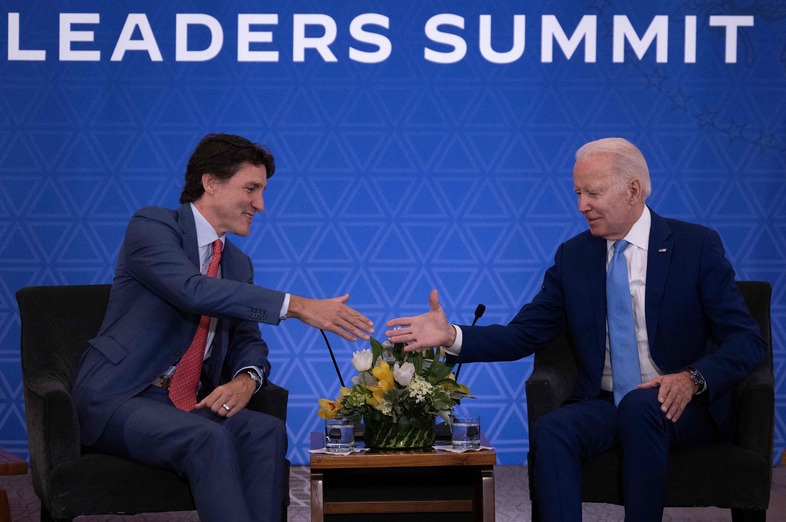The security problem in Haiti will be a major topic of discussion when President Biden visits Canada for the first time as president on Thursday.
The island nation, where heavily armed gangs have assumed control, is gripped by fear and bloodshed. International peacekeepers have been requested by the UN to support the nation’s struggling police force.
Canada has been offered to take the helm of such a global mission by the United States, but Prime Minister Justin Trudeau recently voiced opposition.
At the North American Leaders’ Meeting in Mexico City in January, Biden and Trudeau last had face-to-face contact. Biden would discuss directing an initiative to support Haiti’s national police with Trudeau during that trip, according to White House national security adviser Jake Sullivan.
Finding a nation to assist lead that effort is crucial in the eyes of the United States. Sullivan told reporters, calling it “a big focus” for the trip. Canada has stated a desire to assume a leading position.
But, after careful consideration, the Canadian government has become less enthusiastic about the notion of commanding a peacekeeping force. Raising questions about the capability of the Canadian military to undertake such a mission.
Trudeau opposed military intervention in Haiti during a trip to Newfoundland last week, and instead advocated for police training and sanctions against individuals undermining Haitian institutions.
We are now closely collaborating with allies on the ground to allow the Haitian National Police and other institutions to manage the country in this very difficult period. Since past outside intervention hasn’t succeeded in bringing about long-term stability for Haiti, he told reporters.
According to Henri-Paul Normandin, a former Canadian ambassador to Haiti, the government came to the conclusion that there were few chances for success, several hazards, and insufficient political backing in Haiti.
As a result, Normandin, who is currently a fellow at the German Marshall Fund, stated, “Canada responded, ‘I’m not sure that we want to undertake this.
According to the White House, Biden intends to meet with Trudeau in Ottawa to discuss the situation.
Before the leaders’ meeting, a National Security Council official who spoke on the record under the condition of anonymity said, “We feel that the situation on the ground would not change without military security assistance from international allies.”
The United States is still dedicated to helping the people of Haiti while also holding those accountable for threatening the country’s stability.
The migration issues at the U.S.-Canada and U.S.-Mexico borders have both been exacerbated by the domestic crisis in Haiti. Both presidents are under mounting domestic pressure to address illegal immigration.
A legitimate route was established earlier this year by the Biden administration for some migrants from Haiti, as well as Cuba, Nicaragua, and Venezuela. Nevertheless, it also introduced new regulations that make it simpler to turn away asylum seekers who arrive at an authorised port of entry without first requesting it in a different nation they passed through en route.
Although there are a lot more migrants at the southern border of the United States, there are also an increasing number of people crossing into Canada.
Also, Trudeau has been urged by opposition lawmakers to close a tiny route that crosses the Canadian-American border. Thousands of migrants have crossed into Canada illegally seeking asylum along the motorway connecting New York and Quebec.
A 2004 agreement between Canada and the United States known as the Safe Third Country Agreement has been under some criticism for Trudeau to be renegotiated. His opponents claim that it has gaps that encourage illegal immigration.
According to Eric Miller, a government advisor in Canada, “the migratory crisis is something that is shaking Canada at the moment.” And this is beginning to affect Canadian politicians’ willingness to embrace a sensible immigration policy.
Canada is frequently the first international destination for US presidents. Former President Donald Trump only visited Canada once, for a G-7 meeting in Quebec, and did not make a trip to the nation’s capital while in office. Trudeau and Trump have a tense relationship.
Biden will speak in front of Parliament during his two-day tour. At Trudeau’s home, he and Jill Biden, the first lady, will have a private dinner. On Friday night, they will attend a gala.
Together, Trudeau and Biden have pushed to support Ukraine. When an unexplained object was discovered high over Canada’s Yukon area earlier this year, they also worked closely together. A U.S. military fighter jet from the North American Aerospace Defense Command of the United States and Canada shot it down.
Because to COVID-19 travel limitations, Biden’s first trip to Ottawa was postponed; nevertheless, he has since gone across the globe and by train into a conflict zone before making the quick trip up north.
The people of Canada are aware. According to Laura Dawson, a former senior economic counsellor at the US embassy in Canada, they closely monitor the relationship’s temperature with the United States.
It’s crucial, said Dawson, who is currently working for the nonprofit Future Borders Coalition. “A personal, in-person visit by the president is crucial to reassuring Canadians that this relationship is still crucial to the United States,”















